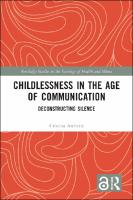Childlessness in the Age of Communication
Proposal review
Deconstructing Silence
Abstract
Cristina Archetti started researching childlessness after being diagnosed with ""unexplained infertility"". She soon discovered that, although involuntary childlessness affects an increasing number of women and men across the world, this topic is shrouded taboo and shame. This book is both a first-person reflection about the existential questions posed by involuntary childlessness and a readable account of the way the silence surrounding this topic is socially and politically constructed.
Revealing the invisible mechanisms that, from the microscopic details of everyday life to policy, make up the structure of silence around childlessness, Archetti demonstrates what it means not to have children in a society that is organized around families. Through a prose that mixes analysis, excerpts of interviews, media fragments, and evocative writing, she develops a new language of feeling-in-the-body fit for the twenty-first century and exposes the devastating effects infertility has on relationships, identity, health and well-being, in societies that fetishize parenthood.
Childlessness in the Age of Communication draws upon a range of disciplines and fields including sociology, health, gender and sexuality studies, communication, politics and anthropology. It is a book for all those interested in childlessness and innovative qualitative research methodologies.


 Download
Download